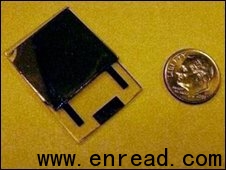| ||||||||||||||||||||||||||||||||||||||||||||||||||||||||
|
researchers have demonstrated a penny-sized "nuclear battery" that produces energy from the decay of radioisotopes. 研究人员展示了一块一便士大小的“核能电池”,该电池可利用放射性同位素的衰变产生电能。  the team hopes to make nuclear batteries much smaller still as radioactive substances decay(衰退,腐败), they release charged particles that when properly harvested can create an electrical current. nuclear batteries have been in use for military and 3 applications, but are typically far larger. the university of missouri team says that the batteries hold a million times as much charge as standard batteries. they have developed it in an attempt to scale down power sources for the tiny devices that fall under the category of micro- and nano-electromechanical systems (mems and nems). the means to power such devices has been a subject of study as vigorous(精力充沛的,有力的) as the development of the devices themselves. liquid solution nuclear batteries are an attractive proposition for many applications because the 2(同位素) that power them can provide a useful amount of current for phenomenally long times - up to hundreds of years or more. as a result, they have seen use in spacecraft that are fired far off into the 4(宇宙). but for applications here on earth, their size has limited their use. the missouri team, led by jae 5 kwon, employed a liquid 6 to capture and utilise(利用,使用) the decay particles. most nuclear batteries use a solid semiconductor to harvest the particles, but the particles' extremely high energies means that the 7 suffer damage over time. this means that to build a battery that can last as long as the 1 inside, they must be built larger. the team's solution incorporates a liquid semiconductor, in which the particles can pass without causing damage. they are now working to further miniaturise the batteries. and although the whole idea hinges on(依……而定) the use of radioactive materials, the devices are safe under normal operating conditions. "people hear the word 'nuclear' and think of something very dangerous," dr jae said. "however, nuclear power sources have already been safely powering a variety of devices, such as pacemakers, space satellites and underwater systems." 点击  收听单词发音 收听单词发音
|
||||||||||||||||||||||||||||||||||||||||||||||||||||||||
- 发表评论
-
- 最新评论

